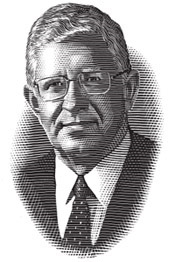|
||
      |
From the President: Belief in responsibility, responsibility in belief
President Don Michael Randel poses a question as raison d’être.
 A
recent book by William Pfaff, titled The Bullet’s Song: Romantic
Violence and Utopia (Simon & Schuster, 2004), observes that myths
of history and utopian visions—especially in the wake of World War
I, when warfare was mechanized and industrialized to the point of enabling
unprecedented slaughter with no redeeming value whatever—motivated
unprecedented inhumanity to man in the name of good works. Violence has
been justified by beliefs in a utopian vision of the future and has been
regarded as redemptive. The principal danger here has arisen from what Pfaff
calls “tragic illusions about history.”
A
recent book by William Pfaff, titled The Bullet’s Song: Romantic
Violence and Utopia (Simon & Schuster, 2004), observes that myths
of history and utopian visions—especially in the wake of World War
I, when warfare was mechanized and industrialized to the point of enabling
unprecedented slaughter with no redeeming value whatever—motivated
unprecedented inhumanity to man in the name of good works. Violence has
been justified by beliefs in a utopian vision of the future and has been
regarded as redemptive. The principal danger here has arisen from what Pfaff
calls “tragic illusions about history.”
Confronted with the fact of death, we all wish to believe that life has a purpose—that it is going somewhere. From that wish, we come easily to the hope or belief that history itself is going somewhere. That desired destination can take a variety of forms, from the workers’ paradise to the worldwide triumph of democracy and free markets to eternal life beyond the grave for those who have been elected to it or earned it in some way. The impulse here is the impulse of the artist, as Pfaff points out, quoting Jacques Maritain. It is the wish to give life “significant form.”
And so the individual will becomes engaged to make the individual life conform to the larger goal of history—to help history along toward that goal, as it were. It should be clear that the structure of these utopian visions is the same, whether in the particular case the frame is political or religious, whether it is the product of the Right or the Left, the East or the West.
In a review of Pfaff’s book [New York Review of Books, May 26, 2005] Pankaj Mishra observes, however, that in the mid-20th century, “a mode of reasoning that retrospectively justified past crimes and legitimized present ones for the sake of an unknown and unknowable future had been embraced by even those political elites that claimed to represent the ‘free world’ or ‘Western civilization.’”
Mishra’s observation, unfortunately, will sound all too familiar. Freedom and democracy are so obviously the good for mankind and the central elements of a utopian view of what the world could and should be that it will be perfectly acceptable to inflict pain and death on any number of people by any number of methods in order to ensure that utopian outcome. This argument gives freedom and democracy a bad name. Freedom no doubt is an essential element in any life that we would care to lead, and it is especially important in the life of this or any other university worthy of the name. But what one can be allowed to do to others in the name of freedom is quite another matter.
What are we as individuals to make of this in daily life? How is it that one can make a life—giving it significant form—if it turns out that the course of history and of any individual life within it is in fact unknowable? A useful formulation of the question is Camus’s: “Is it possible to become a saint without believing in God?” Let us look ourselves in the eye and ask, How would I want to live even if there were no God or no secular utopia in prospect to justify any particular way of living? With death staring me in the face, perhaps hoping there is a God but never able to be quite sure, what is worth doing anyway and how shall I treat my fellow human beings?
A university is, or ought to be, a community in which we try to work this question out on a daily basis. It starts with a belief in freedom—first of all to think as we wish and in so doing to exercise in some significant way the mental faculties that most obviously distinguish us from other creatures. Doing so necessarily entails a respect for the freedom of others to think as they wish. Not so obviously required but surely directly implied is some kind of respect for, and one hopes at times affectionate bond with, others who may think differently. If there is a God, She ought to want that. If there isn’t a God, we ought to want it anyway.
In his short poem “If There is No God,” Czeslaw Milosz captures both our hopes and our doubts—and our responsibilities in the face of them:
If there is no God,
Not everything is permitted to man.
He is still his brother’s keeper
And he is not permitted to sadden his brother,
By saying that there is no God.